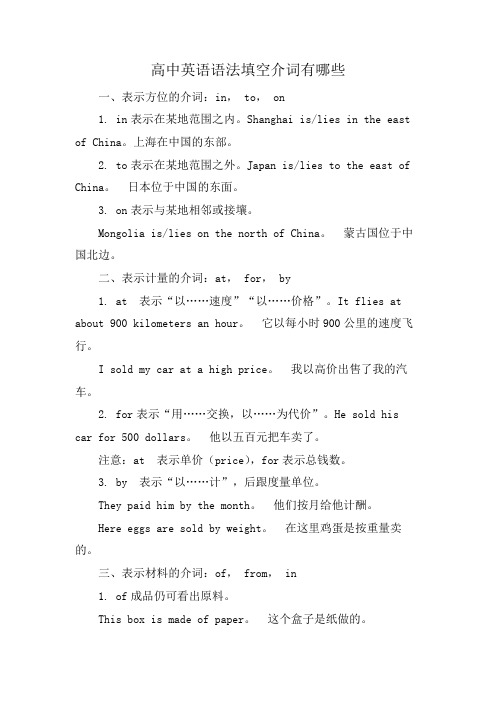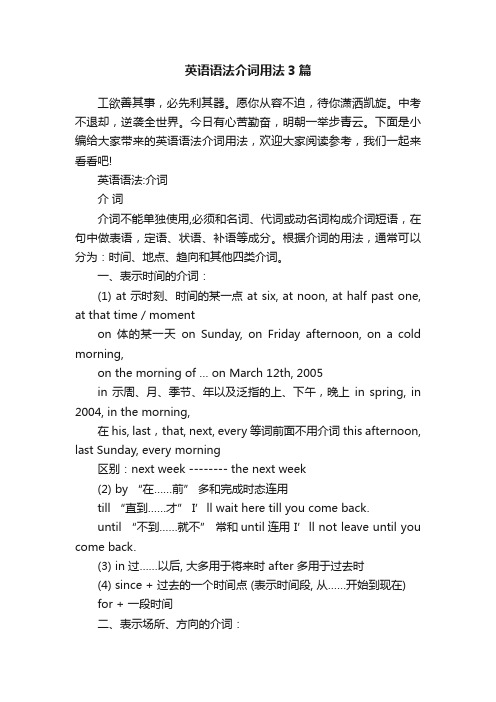语法介词
- 格式:doc
- 大小:57.50 KB
- 文档页数:10

语法归纳介词的分类与用法介词是英语语法中的一类虚词,用于连接名词、代词、动词或其他词组,起到指示、限定或补充的作用。
在日常交流中,正确使用介词可以使句子更加准确、通顺,并且更好地表达自己的意思。
本文将对常见的介词分类和用法进行归纳总结。
一、位置介词(Prepositions of Place)1. On(在……上面):- 表示某物处于平面上,例如:on the table(在桌子上)- 表示某物在某个交通工具上,例如:on the bus(在公交车上)2. In(在……里面):- 表示某物处于空间之中,例如:in the room(在房间里)- 表示某物位于某地,例如:in Beijing(在北京)3. At(在……处):- 表示某物在某个具体位置,例如:at the park(在公园里)- 表示某个时间点,例如:at 9 o'clock(在九点)4. Under(在……下面):- 表示某物处于其他物体下方,例如:under the bed(在床底下)- 表示某物位于某个地理位置下方,例如:under the bridge(在桥下)二、方向介词(Prepositions of Direction)1. To(到……):- 表示向某个地点移动,例如:go to the cinema(去电影院)- 表示给予某人或某物,例如:give the book to Tom(把书给了汤姆)2. From(从……来):- 表示从某个地点出发,例如:come from Beijing(从北京来) - 表示某物来源于某处,例如:a gift from my friend(来自我朋友的礼物)3. Into(进入……内):- 表示进入或穿过某个空间,例如:jump into the pool(跳进游泳池)- 表示某物转化为另一种状态,例如:transform into a butterfly (变成蝴蝶)4. Out of(离开……):- 表示离开某个地点,例如:get out of the car(从车里出来)- 表示摆脱某种状态或限制,例如:break out of prison(越狱)三、时间介词(Prepositions of Time)1. In(在……时):- 表示某个具体时间段,例如:in the morning(在早上)- 表示某个季节或年份,例如:in summer(在夏季)2. On(在……日):- 表示具体的某一天,例如:on Monday(在星期一)- 表示节日或特殊的日期,例如:on Christmas Day(在圣诞节)3. At(在……点):- 表示具体的某个时间点,例如:at 2 p.m.(在下午两点)- 表示某个时刻,例如:at midnight(在午夜)4. For(持续时间):- 表示持续的一段时间,例如:study for two hours(学习两个小时) - 表示某事发生的时间跨度,例如:for the whole week(整个星期)四、原因介词(Prepositions of Reason)1. Because of(因为):- 表示某个原因导致某个结果,例如:He couldn't come because of the bad weather(因为天气不好,他不能来)2. Due to(由于):- 表示某个原因导致某个结果,具有正式文体,例如:The train was delayed due to heavy rain(由于大雨,火车晚点了)3. Owing to(由于):- 与 due to 同义,用法上稍显书面,例如:The match was canceled owing to the lack of players(由于队员不足,比赛被取消)五、方式介词(Prepositions of Manner)1. By(通过、以……方式):- 表示某种方法或手段,例如:travel by plane(乘飞机旅行)- 表示某种交通方式,例如:go to work by bus(乘公交车上班)2. With(用……方式):- 表示伴随或使用某种物品,例如:write with a pen(用钢笔写)六、比较介词(Prepositions of Comparison)1. Like(像):- 表示类似、相似,例如:She looks like her mother(她长得像她妈妈)- 表示比较相近的程度,例如:It tastes like chicken(尝起来像鸡肉)2. Unlike(与……不同):- 较 like 相反,表示与某事物不同,例如:He is unlike his brother in personality(他的性格与他弟弟不同)以上是常见的介词分类和用法总结。

英语语法介词在句子中起什么作用在英语语法中,介词(preposition)在句子中起着多种作用,帮助我们更清晰地描述和表达。
1. 连接名词或代词与其他成分:介词将名词或代词与其他成分(如名词、代词、动词、形容词等)连接起来形成短语。
这样的短语可以作为句子的主语、宾语、定语或状语。
- I bought a gift for my mother.(我给我妈妈买了一份礼物。
)- The book on the table is mine.(桌子上的那本书是我的。
)2. 表示时间:介词可以用来表示时间,指定事件发生的时间点、时间段或频率。
- We will meet at 8 o'clock.(我们会在8点见面。
)- I go swimming every Sunday.(我每个星期天去游泳。
)3. 表示地点:介词可以用来表示地点或位置,描述人或物所处的具体位置或方向。
- She is in the park.(她在公园里。
)- The cat is under the table.(猫在桌子底下。
)4. 表示方向:介词可以用来表示方向,指明人或物的移动方向或目的地。
- He ran towards the house.(他向着房子跑去。
)- The train is heading for London.(火车正驶向伦敦。
)5. 表示原因:介词可以用来表示原因,解释为什么或由于什么原因。
- She cried because of the sad news.(她因为悲伤的消息而哭了。
)- He apologized for his mistake.(他为他的错误道歉。
)6. 表示方式或手段:介词可以用来表示方式、手段或行动的方式。
- She painted the picture with a brush.(她用刷子画了这幅画。
)- He speaks with confidence.(他以自信的口吻说话。

语法中的介词用法总结介词是英语语法中的重要部分,它在句子中起到连接词和名词、代词、动词、形容词等其他成分的作用。
介词的正确使用对于语法的准确性和句子的流畅性至关重要。
本文将总结介词的常见用法,以帮助读者更好地掌握语法中的介词用法。
一、表示时间的介词1. On: 用于具体某一天或日期上,例如:on Monday, on January 1st。
2. In: 用于一段时间或特定季节上,例如:in the morning, in summer。
3. At: 用于具体时间点上,例如:at 7 o'clock, at noon。
二、表示地点的介词1. In: 用于表示大的范围,例如:in the city, in the park。
2. On: 用于表示较小的范围(表面),例如:on the table, on the wall。
3. At: 用于表示具体位置或事件上,例如:at the bus stop, at the party。
三、表示方式的介词1. By: 用于表示交通工具或方式,例如:by car, by walking。
2. With: 用于表示伴随状态或使用某物,例如:with my friend, witha pen。
四、表示原因的介词1. For: 用于表示目的或理由,例如:for fun, for the sake of。
2. Because of: 相当于原因状语从句,例如:because of the rain, because of his absence。
五、表示方式的介词1. In: 用于表示方式或状态,例如:in surprise, in a hurry。
2. With: 用于表示带有某种特征或状态,例如:with pleasure, with a smile。
六、表示对象的介词1. By: 用于表示方式、手段或代替某人做某事,例如:by email, by myself。

高中英语语法填空介词有哪些一、表示方位的介词:in, to, on1. in表示在某地范围之内。
Shanghai is/lies in the east of China。
上海在中国的东部。
2. to表示在某地范围之外。
Japan is/lies to the east of China。
日本位于中国的东面。
3. on表示与某地相邻或接壤。
Mongolia is/lies on the north of China。
蒙古国位于中国北边。
二、表示计量的介词:at, for, by1. at 表示“以……速度”“以……价格”。
It flies at about 900 kilometers an hour。
它以每小时900公里的速度飞行。
I sold my car at a high price。
我以高价出售了我的汽车。
2. for表示“用……交换,以……为代价”。
He sold his car for 500 dollars。
他以五百元把车卖了。
注意:at 表示单价(price),for表示总钱数。
3. by 表示“以……计”,后跟度量单位。
They paid him by the month。
他们按月给他计酬。
Here eggs are sold by weight。
在这里鸡蛋是按重量卖的。
三、表示材料的介词:of, from, in1. of成品仍可看出原料。
This box is made of paper。
这个盒子是纸做的。
2. from成品已看不出原料。
Wine is made from grapes。
葡萄酒是葡萄酿成的。
3. in表示用某种材料或语言。
Please fill in the form in pencil first。
请先用铅笔填写这个表格。
They talk in English。
他们用英语交谈。
四、表示工具或手段的介词:by, with, on1. by用某种方式,多用于交通。

语法|英语介词知识点用法总结!1.In(在,表示时间、地点、状态):- 表示具体的时间点或时间段:in the morning(早晨)、in May(五月)、in 2024(2024年)- 表示地点:in the park(在公园里)、in London(在伦敦)- 表示状态:in trouble(陷入困境)、in love(恋爱中)2.On(在,表示时间、地点、表面):- 表示具体的日期或星期几:on Monday(星期一)、on December25th(12月25日)- 表示地点:on the bus(在公交车上)、on Main Street(在主街上)- 表示表面:on the table(在桌子上)3.At(在,表示时间、地点):- 表示具体的时间:at 8 o'clock(在8点钟)、at noon(在中午)- 表示地点:at the cinema(在电影院)、at home(在家)4.To(到,表示方向或目的地):- 表示目的地:a trip to Paris(巴黎之行)、a letter to John (写给约翰的信)- 表示出发地:a flight from New York(从纽约起飞的航班)、a train from London(从伦敦开出的火车)- 表示原因:suffer from a cold(患感冒)6. For(为了,表示目的、受益人):- 表示目的:study for the exam(为考试而学习)、buy flowers for my mother(给母亲买花)- 表示受益人:a gift for you(给你的礼物)7. With(和,表示伴随、使用、具备):- 表示伴随:go shopping with friends(和朋友一起购物)、have dinner with family(和家人一起吃晚饭)- 表示使用:write with a pen(用钢笔写)- 表示具备:a girl with long hair(一位长发的女孩)以上是一些常见的英语介词及其用法总结,介词在句子中使用灵活多样,需要根据具体语境来选择适当的介词。

英语语法介词用法3篇工欲善其事,必先利其器。
愿你从容不迫,待你潇洒凯旋。
中考不退却,逆袭全世界。
今日有心苦勤奋,明朝一举步青云。
下面是小编给大家带来的英语语法介词用法,欢迎大家阅读参考,我们一起来看看吧!英语语法:介词介词介词不能单独使用,必须和名词、代词或动名词构成介词短语,在句中做表语,定语、状语、补语等成分。
根据介词的用法,通常可以分为:时间、地点、趋向和其他四类介词。
一、表示时间的介词:(1) at 示时刻、时间的某一点 at six, at noon, at half past one, at that time / momenton 体的某一天on Sunday, on Friday afternoon, on a cold morning,on the morning of … on March 12th, 2005in 示周、月、季节、年以及泛指的上、下午,晚上in spring, in 2004, in the morning,在his, last,that, next, every 等词前面不用介词this afternoon, last Sunday, every morning区别:next week -------- the next week(2) by “在……前” 多和完成时态连用till “直到……才” I’ll wait here till you come back.until “不到……就不” 常和until连用I’ll not leave until you come back.(3) in 过……以后, 大多用于将来时 after 多用于过去时(4) since + 过去的一个时间点 (表示时间段, 从……开始到现在)for + 一段时间二、表示场所、方向的介词:(1)at 表示比较具体的地点 at 37 Renming Roadin 表示比较宽敞的地点 in Renming Street(2)above斜上方-------below斜下方over正上方-------under 正下方on 两物体有接触(3) between…and..在……和……之间 among在……中间(三者以上)(4) across (从物体表面)跨越, 越过 through (从物体中间)穿透, 穿越(5)in 在……里面(表示静止的位置) into 进入,表示运动方向,常用在表示动作的动词之后, 如 go, come, walk, jump, run 等 into的反义词是out of(6)to 到 (目底地)或方向 towards 指朝着某方向,而不是目的地.He walked towards the beach.三、其它介词1.with (1)在一起; (2)有; (3)用某种工具in 用什么材料或语言,或表示衣着,声调特点等by 用......手段2.Like 象......一样as 作为;按照,象......一样(连词)+ 句子3.for(1)为了(表示目的或原因) (2)(后面加一段时间)表示时间段英语中考:介词短语[介词短语聚焦]“介词+名词/代词”所构成的短语称为介词短语。
语法:介词1.概念:介词是一种用来表示词与词, 词与句之间的关系的词。
在句中不能单独作句子成分(虚词)。
介词后面一般有名词、代词或相当于名词的其他词类、短语或从句作它的宾语。
介词和它的宾语构成介词词组,在句中作状语。
2.分类:介词可以分为时间介词、地点介词、方式介词、原因介词、数量介词和其他介词。
Ⅰ. 时间介词:1、表示在某时间,常用at,on,in等。
①用at来表示点时间、年岁:at six 在6点钟at sixteen 16岁的时候②用on来表示具体某一天、星期:on Monday 在星期一on January fifth 在1月5日③用in来表示某年、某月、某季节,早中晚。
in the morning/afternoon/evening 在早晨,下午,晚上in January 在一月in Spring在春天拓展:A. in+颜色,表穿……,戴…… in red穿红色的衣服A.in意为“在……方面” do well in... 在……方面做得好2、表示一段时间、期间常用during,for,over,within,throughout,from和to等。
①during用于已知的一段时间包括大家熟知的节日或者某种已确切限定的时期或阶段之前during 1942 在1942年中②for用来表示一段时间for six years 六年之久3、表示其他时间概念的前置词有before,after,since,until,till,between,up to等Ⅰ. 地点介词(表示方位、空间)1、at,in,on,to① at表示在小地方;表示“在……附近,旁边”① in表示在大地方;表示“在……范围之内”。
① on表示毗邻,接壤,“在……上面”。
拓展:on表向前移动on the left/right向左/右移动① to表示在……范围外,不强调是否接壤;“到……”2、above,over,on【了解】① above 指在……上方,不强调是否垂直,与below相对;① over指垂直的上方,与under相对,但over与物体有一定的空间,不直接接触。
最新现代汉语语法――介词
介词是汉语语法中一个非常重要的部分。
在句子中,介词常常用来表示时间、空间、方式、原因等多种语义。
本篇文章将会包含最新的介词用法介绍,希望能够帮助读者更好地理解并运用介词。
一、表示时间
1.在……之前
在表示时间的介词之中,最常用的是“在……之前”。
例如:
在我睡觉之前,请不要打扰我。
2.在……以后
除了“在……之前”,表示时间上久远的事件时,我们也会使用“在……以后”。
例如:
这部电影在我小时候看过以后,我一直记忆犹新。
3.在……期间
我在读书期间参加了很多社团活动。
我的钢笔在桌子上。
当物体处于容器内部时,我们通常使用“在……里面”。
例如:
那个馅饼里面装了很多甜豆。
他站在两棵大树之间。
三、表示方式
表示方式的介词有很多,比如:
1.用……来……
在描述动作时,我们会使用“用……来……”这种介词组合。
例如:
我用铅笔来写字。
表示做某件事情的方式时,我们可以使用“以……方式”的表述方式。
例如:
他以跑步的方式燃烧脂肪。
四、表示原因
我的头发变黄了,因为我常常游泳。
“由于”是介词中用得次多的一个,也可以用来表示原因。
例如:
由于天气很热,我没有去散步。
这几种介词用法是日常生活中最常用的一些,掌握了这些介词之后,我们的汉语表达就更加自如了。
高中英语语法介词介词是英语语法中非常重要的一部分,它们用来表示名词或代词与句子其他成分之间的关系。
下面我们将介绍一些常见的介词及其用法,并给出一些例子。
1. atat通常用于表示在一个时间点或地点。
例如:I will meet you at the airport. 我在机场和你见面。
They arrived at the station at 8 o'clock. 他们八点到达车站。
2. inin通常用于表示在一个较大的空间或时间范围内。
例如:I live in a small town. 我住在一个小城镇。
The concert will be held in the park. 音乐会将在公园举行。
3. onon通常用于表示在某个物体或表面上。
例如:Put the book on the table. 把书放在桌子上。
The cat is sitting on the mat. 猫正坐在垫子上。
4. underunder通常用于表示在某个物体或下方的位置。
例如:The table is under the window. 桌子在窗户下。
The cat is under the bed. 猫在床下。
5. nearnear通常用于表示在某个物体或地方附近的位置。
例如:The school is near the railway station. 学校在火车站附近。
They sat near the fire. 他们坐在火堆旁边。
6. behindbehind通常用于表示在某个物体或人的后面位置。
例如:The car is behind the tree. 车在树后面。
The cat is behind the sofa. 猫在沙发后面。
7. beforebefore通常用于表示在某个物体或人的前面位置。
例如:The bus stop is before the bridge. 公交车站桥前面。
一:简单介词1. about:大概、差不多、关于短语:be about to do:正要做…打算做…What / How about doing / sth…?she left on or about the eighth of May.He is about 187cm tall.What are you talking about?They are about to leave.How about having a picnic? = What about a picnic?2. above:在上面、超过、高于短语:above all(最重要的是,尤其是)The water was already above our knees.The coat costs above $ 10.He is above me in rank.The book is above my understanding.3. after:在…以后(时间)、在…后面(位置)、接着短语:after all(毕竟、到底), look after(照顾)one after another(接二连三)year after year (年年岁岁)He will be back after three o’clock.Shut the door after you, please.We all work day after day, without break.4. against:向着、正对着、逆反、倚靠短语:fight against(和…打架)My house stands against the church.Can you show any evidence against him?He saw a woman leaning against a pine tree.5. at:在综合地点、小地点、朝向、在某一年龄、在某方面、在某温度、以某速度、在某价格短语:at the age of(在几岁时)at the end of(在末端终点处)at night / noon(在午夜、正午)at dawn / dusk(在清晨、黄昏)at least / most(最少、最多)She lives at 203 Alley 20 Lane 150 Street.The dog barked at a stranger.He retired at 60.We aren’t good at sports.The tea is sold at the rate of 60 dollars a pound.6. before:在之前(时间)、在前面(位置)短语:before long(不久以后)long before(很久以前)He died before the first world war.He paused before the door.We should put quality before quantity.7. beyond:在之外(空间)、超出短语:beyond words(难以言喻)beyond doubt(无可怀疑)There is a village beyond the river.He has gone beyond seas.The situation is beyond his control.8. but:除…之外短语:nothing but (只是、只不过)but for(要不是、如果没有)Nobody saw it but me.She could do nothing but wait.They had no choice but to give up.But for your help, he would have failed.That’s nothin g but a joke.9. by:在旁边、经过、在之前、用某种方式、根据、被短语:step by step / little by little (逐步、渐渐)by accident(偶然意外地)by mistake(弄错)by post / car(邮寄、乘车)by hand(徒手)He was sitting by me.They came by the nearest road.He had finished his work by 9 last night.The news came by telegram.He moved forward inch by inch.10. for:为了、因为、适合短语:for the time being (暂时、目前)for life(终生)I did it only for you.The class trains students for the coming contest.He is the man for the job.What are you looking for?I can’t do it for I am sick now.11. from:始于、来自、根据、由于、避免、区别、因为短语:from now on(从现在起)from A to B:from bad to worse(每况愈下)She has been ill from youth.They all come from India.The artist was always out painting from nature.She trembled from fear.The wine is made from rice.We had better protect the animals from danger.He is old enough to know right from wrong.The man died from a wound.12. in:在里面、在之内、在某方面、关于、处于、按照、用、穿戴、用声音短语:in black(穿黑色衣服)in high spirits(情绪高昂)in danger(有危险)in other words(换言之)in tears(流泪)in anger(愤怒)in trouble(有麻烦)in pain(在痛苦之中)in fear(在恐惧之中)in safety(安全)in fact(实际上)in short(总之)短语:in good health(身体健康)in public(公开地)in addition(另外)in rows(一排排)in time(及时)in no time(马上)in all(总计、合计)in the sun(在阳光下)He was wounded in the leg.I will be back in one year.It is a book in Chinese history.She is in glasses.I believe in you. She speaks in a quiet voice.13. into:进入、朝向、直到、转为、从事短语:turn into (转变为)Don’t run into the meeting hall.She married into an influential family.They talked into the night.The pines have grown into big trees.14. of:的、由制成、具有某种性质、关于、在某方面、因为、由于短语:of one’s own(某人自己的)get rid of(摆脱)She is a friend of mine.The house is made of stone.The matter is of great significance.What do you think of this book?The city of Nanjing is nice.He is a musician of talent.He died of cancer.15. on:在上面、靠近、关于、通过、处于、短语:on duty(值班之日)on leave(请假休假)on sale(大甩卖)on fire(着火)on the contrary(相反地)on one hand, on the other hand(一方面,另一方面)He laid his hand on her shoulder.There is a cottage on the lake.We live on wages.He was writing a paper on Dickens.She is on the school basketball team.I heard the news on the radio.16. out of:从里面、脱离、缺乏、出于短语:out of danger(脱险)out of control(失去控制)out of date(过时)run out of(用光耗尽)out of breath(上气不接下气)out of sight(看不见)The boy took a piece of candy out of the box.The family is out of food.He did it just out of kindness.17. to:朝向、离、直到、对于、属于、为了、致使短语:as to(关于、至于)prefer to(宁可)according to(根据)due to(由于、因为)to one’s surprise(让某人惊讶的是)in addition to(除了…之外)The house looks to the south.There are ten miles to the nearest shop.She stayed here to the end of this year.The key to the door was found by my son.18. under:在下面、少于、在条件下短语:under the control of(在…控制之中)under discussion(在讨论中)They slept under the stars.Under these conditions, no progress is possible.The road is under repair.The girl is under four years old.19. with:和、支持、具有、随着、用以、穿戴短语:with fear(害怕地)agree with(同意)in connection with(与…联系)with one’s eyes(亲眼所见)in touch with(与…接触)be crowded with (挤满了…)be filled with (塞满了…)get on with(和某人相处、处理某事)He lived with his parents.He sympathized with the girl.She is a woman with a hot temper.Have you got any money with you?With their help, we succeeded.Her face were white with fear.With all his faults, he is an honest man.How are getting along with you job?二:表示时间的介词1. at:表示在某个时间点,也就是时刻;在进餐的时间;在一天中的某个时间点;也表示正在做某事,放在长期假日或节日前。